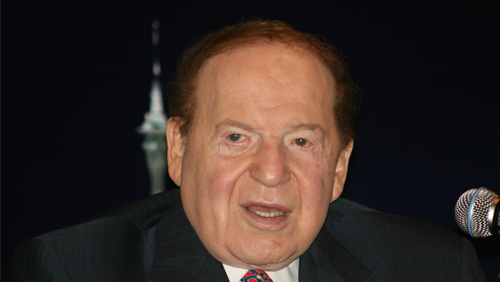Imagine what could be done with $65,750 per day in salary. The vast majority of the world’s population can only dream, but there are some executives out there making that, and more. A new report by the Las Vegas Review-Journal explorers the salaries of the CEOs of some of the top gaming companies in the US and, across the board, all of them saw a decrease in their compensation last year. Regardless, it’s still impossible to feel bad for someone who makes more money in a day than most make all year.
 No one should be surprised that the individual making $65,750 a day is Las Vegas Sands’ founder and CEO Sheldon Adelson. He has a net worth of around $36.9 billion, according to Forbes, and his paycheck, as well as his wallet, give him ample cash to throw around to various “charitable” causes, such as getting the Department of Justice to sing a different tune about the Federal Wire Act and online gambling.
No one should be surprised that the individual making $65,750 a day is Las Vegas Sands’ founder and CEO Sheldon Adelson. He has a net worth of around $36.9 billion, according to Forbes, and his paycheck, as well as his wallet, give him ample cash to throw around to various “charitable” causes, such as getting the Department of Justice to sing a different tune about the Federal Wire Act and online gambling.
Last year, Adelson earned $5 million as his base salary, $1 million in awards, $5.5 million in “other compensation” and $12.5 million as part of a non-incentive equity plan. He made $26 million a year earlier. By way of comparison, Adelson’s salary is about $24,000 more than what he pays his average employee for an entire year’s-worth of labor.
Mark Frissora, who is about to bid adieu to Caesars Entertainment, earned $13.2 million. It would take the company’s average employee 360 years to earn that much. He’ll earn a going-away package to soften his exit, as well, but his 2018 compensation reflects a drop of around $10 million from the previous year.
The CEO of MGM Resorts, Jim Murren, took home $12.8 million, down from $14.5 million a year earlier, and Boyd Gaming CEO Keith Smith pocketed $7.8 million. That was a drop of about $800,000 from 2017. The Review-Journal report shows that Frank Fertitta III, the billionaire who steers the helm at Red Rock Resorts, earned $1.96 million. He was the only one to see an increase, having earned $1.94 million a year earlier.
Virtually all commerce markets saw drops last year, especially in the second half. There was an increase in volatility throughout the period, which was demonstrated by the drops seen in the Standard & Poor’s 500 – 6.2% – and the 5.6% decline in the Dow Jones Industrial Average. Even NASDAQ slipped, down 4% in the period. The gaming industry took an even bigger hit, however. The Vectors Gaming ETF (exchange-traded fund), which measures 43 stocks that are invested in the gaming industry, dropped almost 30%.